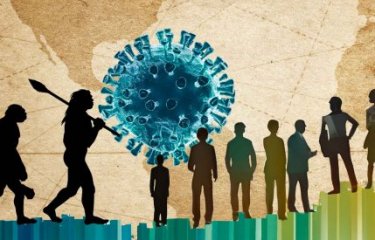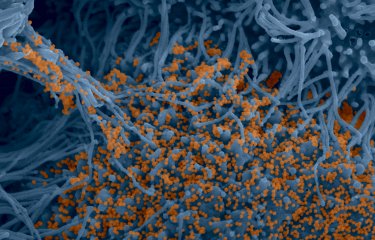-ENGLISH VERSION COMING SOON-
Mis à jour le 20 mars 2023.
En 2020-2021, lorsque la pandémie de Covid-19 était à son pic, de nombreuses informations circulaient dans les médias, sur les réseaux sociaux, les messageries instantanées, etc. Ces messages ont pu parfois contenir des informations erronées ou s’appuyant sur des propos attribués à tort à des chercheurs de l’Institut Pasteur à Paris. Dans un contexte de crise sanitaire et d’infodémie, c’est-à-dire de circulation rapide d’un grand nombre d’informations, vraies ou fausses, il apparaît important de garder un esprit critique et d’être vigilant avant de relayer certaines informations (lire notre article "Crises sanitaires, crises de l’information : aux sources du terme « infodémie »”).
Des fausses informations qui ont circulé durant la pandémie, il faut retenir que l’Institut Pasteur n’a pas inventé le SARS-CoV-2, le virus à l’origine de la Covid-19.
Des propos diffamatoires ont en effet accusé l’Institut Pasteur d’avoir créé le SARS-CoV-2. Et, pour la première fois depuis sa création, l’Institut Pasteur a porté plainte.
Un jugement a été rendu en faveur de l’Institut Pasteur, le 2 novembre 2020, condamnant l’auteur des faits pour diffamation. Ce jugement a été confirmé par la cour d’appel d’Amiens le 11 janvier 2023.
A propos de l’origine du SARS-CoV-2
Le coronavirus SARS-CoV-2, responsable la pandémie actuelle de Covid-19, est différent du SARS-CoV-1 ayant entrainé une épidémie de SRAS en Asie du Sud-Est en 2003. Il est scientifiquement faux de dire qu’ils sont génétiquement identiques en tout point.
Ces deux virus, SARS-CoV-1 et SARS-CoV-2, appartiennent bien à la famille des coronavirus (qui comptent également d’autres virus) mais sont deux virus bien distincts.
L’Institut Pasteur n’a pas inventé de virus (pas plus le SARS-CoV-2 que le SARS-CoV-1) mais il a déposé un brevet, en 2004, concernant un candidat-vaccin contre le SARS-CoV-1.
Plus généralement au sujet de l’origine du coronavirus SARS-CoV-2 :
La description des premiers cas de SARS-CoV-2 aux abords du marché de Wuhan plaide en faveur d’un franchissement naturel de la barrière d’espèces à partir d’un hôte intermédiaire commercialisé à cet endroit. Cette hypothèse dite « zoonotique » est la plus probable selon les scientifiques, mais les recherches doivent se poursuivre avant de pouvoir l’établir formellement.
Le franchissement de barrière d’une espèce à une autre, directement à partir du réservoir animal sauvage, ou à partir d’un hôte intermédiaire, a déjà été mis en évidence pour de nombreux virus. Il peut être suivi de transmissions interhumaines (VIH, Ebola, SARS…) mais pas toujours (grippe aviaire). Les mécanismes adaptatifs sous-jacents sont variés.
Une seconde hypothèse, formulée dans le rapport SAGO, ne peut être écartée sans être pour autant scientifiquement prouvée : la possibilité d’une introduction du SARS-CoV-2 dans la population humaine à la suite d’une fuite de laboratoire, que cette fuite ait affecté un coronavirus conservé à l’état naturel ou un coronavirus modifié volontairement ou non au laboratoire. Le rapport SAGO indique à ce sujet que « des renseignements supplémentaires [sur la mise en œuvre institutionnelle des pratiques de biosûreté et de biosécurité des laboratoires] devront être obtenus et examinés pour formuler des recommandations concluantes. »
Enfin, l’hypothèse d’une fabrication du virus en laboratoire à des fins d’introduction dans la population est rejetée par la quasi-totalité de la communauté scientifique : elle a notamment été alimentée par des fake news ou encore certains articles, controversés et dénués de fondement scientifique.
Lire l’article « Origine du SARS-CoV-2 : les recherches se poursuivent »
Un traitement par l'ivermectine testé chez l'animal, pas chez l'être humain
L'Institut Pasteur n'a jamais évalué (et encore moins confirmé) l'efficacité de l'ivermectine chez l’être humain comme traitement contre la Covid-19.
En juillet 2021, l'Institut Pasteur a bien mené une étude pré-clinique dont les résultats démontraient que cette molécule pouvait atténuer certains symptômes chez l'animal.
Pour confirmer ou infirmer cet effet chez l'être humain, il est essentiel de mener des essais cliniques et de se référer aux résultats de ces essais cliniques uniquement. En effet, une étude pré-clinique n'est pas suffisante pour envisager un usage médical.
A propos de l’Institut Pasteur
L’Institut Pasteur est un centre de recherche biomédicale, avec le statut de fondation reconnue d’utilité publique, indépendante et à but non lucratif. Son expertise historique dans les maladies infectieuses l’a amené naturellement à travailler sur le SARS-CoV-2 et l’épidémie de Covid-19.
Nous vous invitons à découvrir les recherches menées par l'Institut Pasteur sur le SARS-CoV-2 depuis le début de la pandémie.
Vous pouvez également vous abonner aux comptes officiels de l’Institut Pasteur sur Facebook,Twitter, LinkedIn et Instagram, pour suivre notre actualité.
Pour en finir avec les idées reçues
ou signaler les informations erronées en ligne,
rendez-vous sur le site de l’Organisation mondiale de la santé
For more information, please visit





